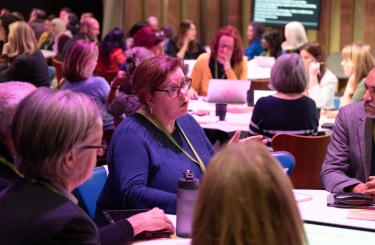

Earlier this week, we presented key findings from our 2025 Member Audit. Members joined us online at our April 2025 Insight Meeting, where we gave an overview of the data, specifically examining: where our members are funding; how and what they are funding; how funders advance equity and take action against climate change; how they collaborate with each other; and their priorities for the future. We’re pleased to share some of these findings in this blog post and encourage everyone to explore the full data here.
Where do our members fund?
41% of respondents stated they funded or supported ‘all London Boroughs' - a slight decrease from our 2023 Audit which found that 44% funded all boroughs. Among the specific boroughs selected by respondents as areas they fund or support, the ‘coldest’ (i.e. the boroughs identified as getting the least amount of funding in our member audit) were:
1. Havering (2% selected)
2. Barking and Dagenham (3% selected)
3. Sutton, Bromley, Kingston Upon Thames, Hillingdon (4% selected)
4. Redbridge, Harrow (6% selected)
5. Richmond Upon Thames (7% selected)
However, according to the data, many of the ‘coldest’ boroughs were also identified as places where respondents are proactively working to increase their grant-making and support. Most notably:
- Enfield (30%)
- Bexley, Brent and Harrow (26%)
- Barking and Dagenham, Havering, Lewisham, Redbridge, Waltham Forest (22%)
Recognising the historic lack of funding in these areas and the need to be proactive, we can see an increase in support to some of these ‘cold spots’. Additionally, reflections from members at the Insight Meeting highlighted that increased funding in these ‘colder’—typically outer—London boroughs should be accompanied by long-term planning and infrastructure to strengthen the voluntary and community sector’s capacity and resilience.
How do our members fund?
Respondents shared they provide grants of varying lengths, with almost a quarter giving grants of five years or more; and 20% issuing four year grants. This marks an increase from 2023 where only 10% of respondents awarded grants lasting longer than for years. These findings make it clear that more and more London Funders’ members are recognising the importance of providing the capital’s groups and charities with long-term support is essential to making the city a better place for our communities.
Respondents also identified restricted grants, core grants, and unrestricted grants as the three most popular types of funding distributed in the last financial year – mirroring 2023’s findings. Additionally, 70% of respondents said they offered non-monetary support to their charity partners to build their capacity and resilience – see the full data set for practical examples of how they’re doing this.
We provide capacity building support to our grantees to support their growth, so they become sustainable
What do our members fund?
Similar to 2023, respondents’ five most commonly funded areas in this year's audit were:
- Children and Young People (84%)
- Education, Employment and Training (62%)
- Poverty (58%)
- Community resilience, integration and cohesion (51%)
- Advice (54%)
That the most common themes funded have not changed since 2023 could suggest a consistency in funders’ preferred areas of focus. Member reflections from the insight meeting noted that, since many funders have recently completed or are undergoing strategic reviews, it would be interesting to see if these thematic priorities change.
Additionally, members in the meeting observed a decrease in respondents selecting ‘Crime and social justice’, ‘environment’, and ‘campaign and advocacy’ as themes they fund. However, this could indicate that funders are embedding equity and climate action principles across all their grant programmes and ways of working, rather than a shift away from these themes.
How are funders advancing equity and taking action on climate change?
This year, funders shared several practical ways they are advancing equity and taking action on climate change. See the full data set for details on how, but in summary:
Respondents said they are advancing equity through:
- Application & process redesign
- Decision-making & grants policy diversification
- community engagement & codesign
- Capacity-building & flexible funding
- Data collection & monitoring
- Strategic governance & accountability
Equity is not a fixed destination for us — it’s a continuous journey of listening, learning, and reimagining how voice, and resources are shared
And they are embedding climate action through:
- Direct climate-focused funding
- Climate considerations in applications & reporting
- Internal operational sustainability
- Capacity building & sector support
We are embedding climate action into our work by taking an intersectional approach that recognises the links between environmental sustainability, social justice, and community resilience
How are funders collaborating with each other?
81% of respondents highlighted ‘intelligence sharing’ as the most common way they collaborate with other funders, an increase from 62% in 2023. Our local funder forums, thematic member-led networks, and learning programme create opportunities for members to connect, learn together, and share insights.
Comparatively, ‘pooled funding’ saw a decrease from 39% (2023) to 25% (2025). We believe that the availability of spaces like the Collaboration Circle will encourage funders to come together with civil society partners to design more equitable ways to pool resources and expertise. Read more about how we plan to do this here.
Looking ahead: key challenges and priorities
Over the next 18 months, Londoners will face intersecting challenges that continue to widen inequalities
Respondents identified the following key challenges facing Londoners over the next 18 months:
- Housing crisis
- Cost of living and poverty
- Pressure on public and voluntary services
- Rising social inequality
- Mental health and barriers to employment for young people
- AI integration risks
As a result, key priorities for funders include:
- Community engagement & empowerment
- A commitment to equitable funding principles rooted in participation
- Youth, education and leadership
- Equity, inclusion and justice
- Environmental and climate action
- Organisational & strategic development
- Learning, evaluation and knowledge sharing
We want to extend a huge thank you to all members who shared their views and data in this year’s audit. Your contributions are essential in building a comprehensive picture of London’s funding ecosystem and members’ priorities.
From this year’s findings, it’s encouraging that members continue to value collaboration, and are actively advancing equity in their grant making and operations. We will use these results to shape our learning and events programme, convening members around the issues that matter most in our collective efforts to build a safer, greener and more equitable London.
We’re always keen to hear more from members about your current priorities and any ideas you might want to share so do book a meeting with our Membership Manager, Nasyah here.


